Unit 5 Good manners Comic-reading主要知识点课件27张
文档属性
| 名称 | Unit 5 Good manners Comic-reading主要知识点课件27张 |  | |
| 格式 | pptx | ||
| 文件大小 | 134.3KB | ||
| 资源类型 | 教案 | ||
| 版本资源 | 牛津译林版 | ||
| 科目 | 英语 | ||
| 更新时间 | 2022-04-03 13:30:31 | ||
图片预览

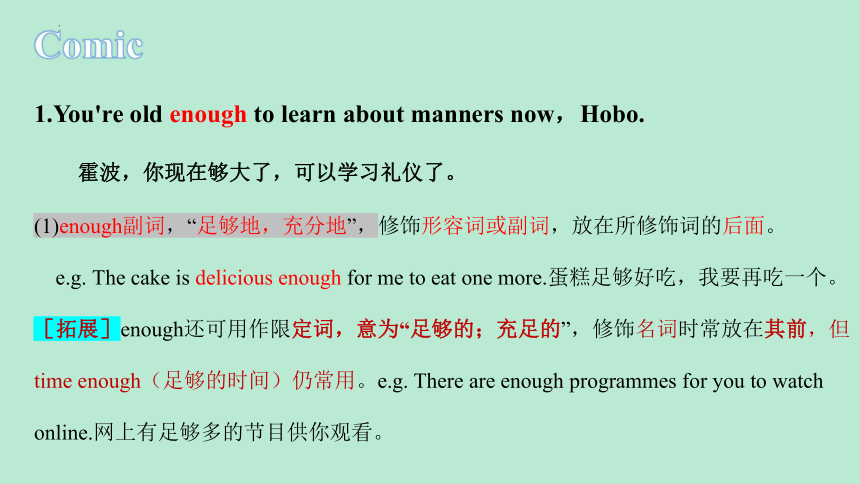
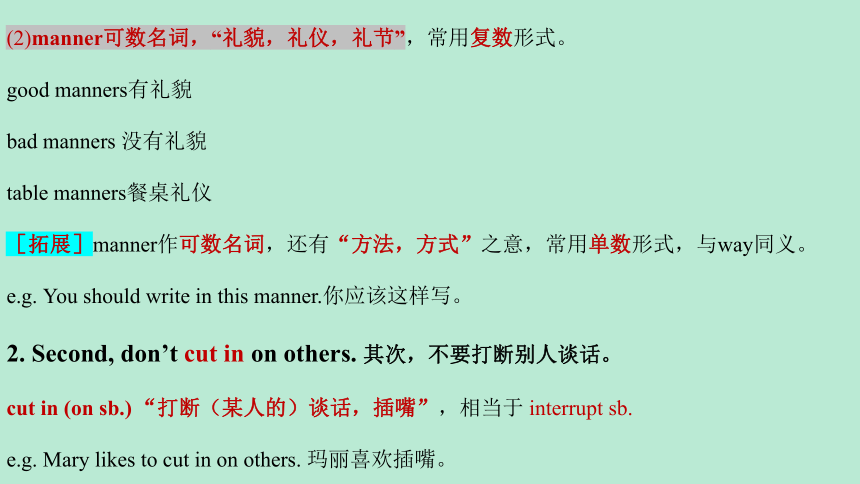
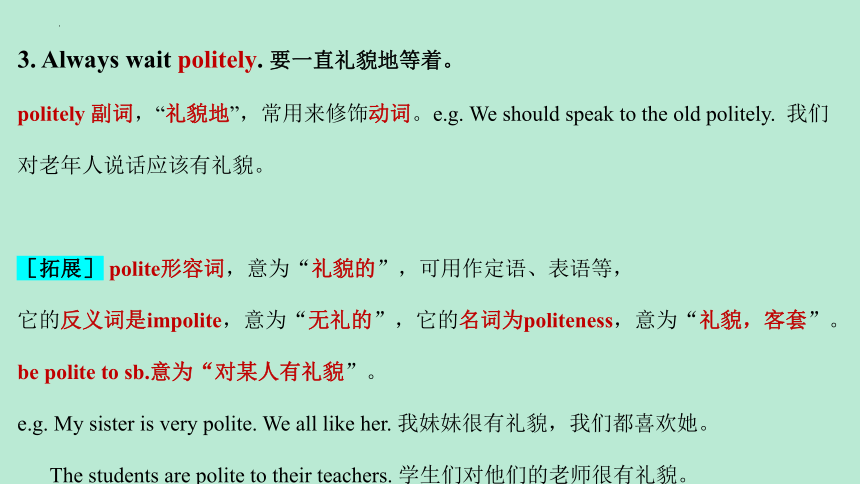
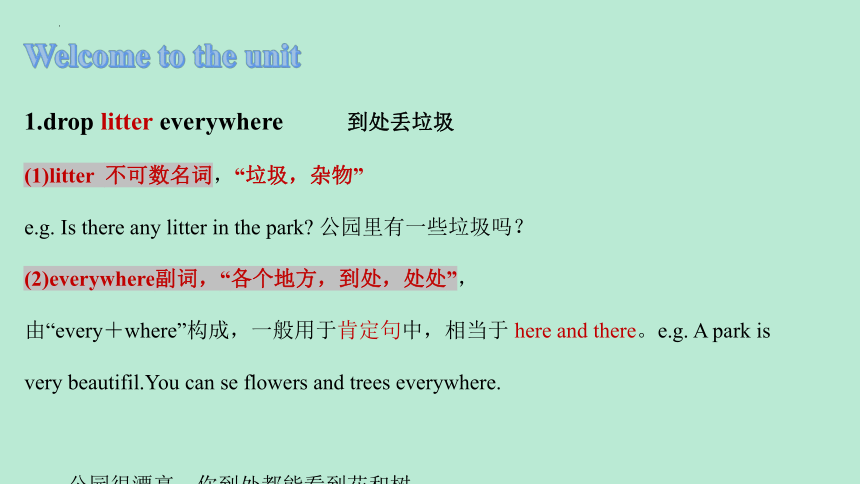
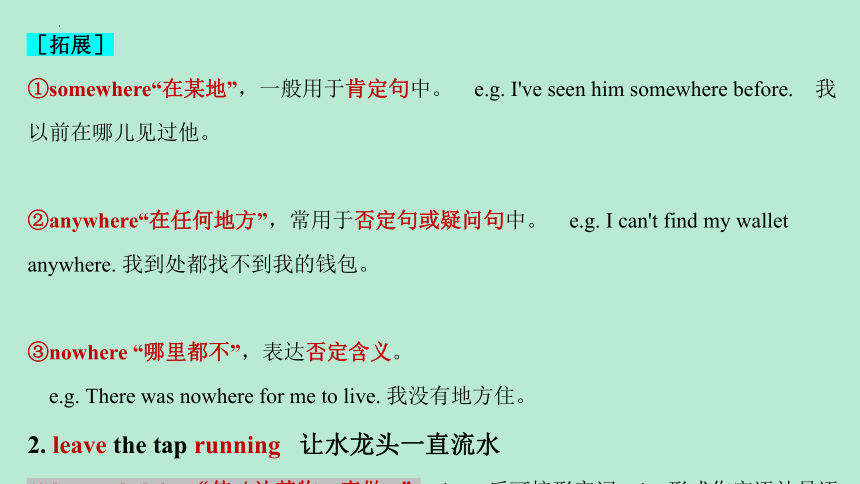
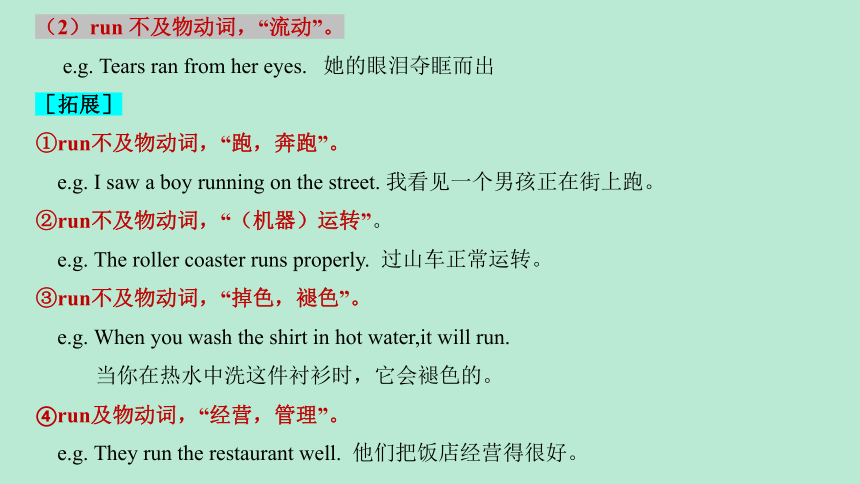
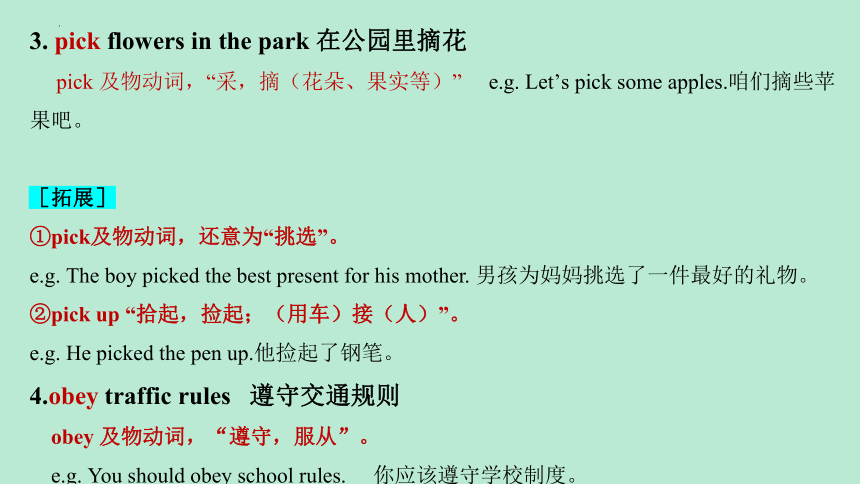
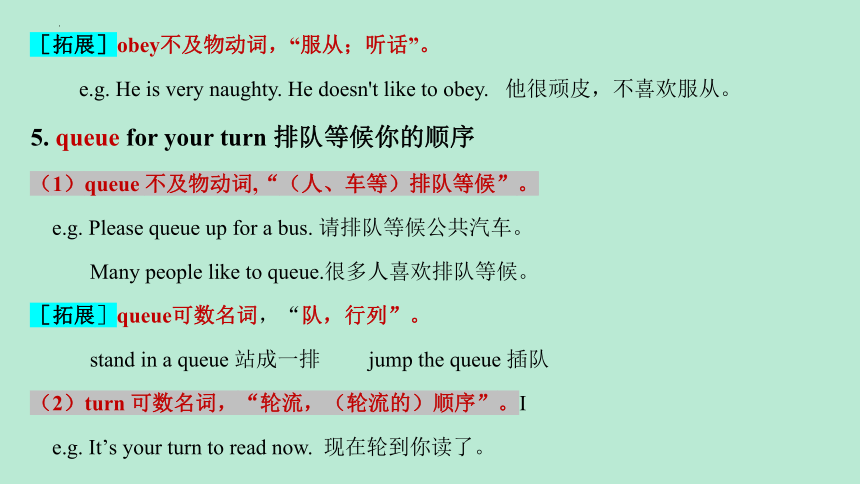
文档简介
(共27张PPT)
Good manners
(main points)
Comic
1.You're old enough to learn about manners now,Hobo.
霍波,你现在够大了,可以学习礼仪了。
(1)enough副词,“足够地,充分地”,修饰形容词或副词,放在所修饰词的后面。
e.g. The cake is delicious enough for me to eat one more.蛋糕足够好吃,我要再吃一个。
[拓展]enough还可用作限定词,意为“足够的;充足的”,修饰名词时常放在其前,但time enough(足够的时间)仍常用。e.g. There are enough programmes for you to watch online.网上有足够多的节目供你观看。
(2)manner可数名词,“礼貌,礼仪,礼节”,常用复数形式。
good manners有礼貌
bad manners 没有礼貌
table manners餐桌礼仪
[拓展]manner作可数名词,还有“方法,方式”之意,常用单数形式,与way同义。
e.g. You should write in this manner.你应该这样写。
2. Second, don’t cut in on others. 其次,不要打断别人谈话。
cut in (on sb.) “打断(某人的)谈话,插嘴”,相当于 interrupt sb.
e.g. Mary likes to cut in on others. 玛丽喜欢插嘴。
3. Always wait politely. 要一直礼貌地等着。
politely 副词,“礼貌地”,常用来修饰动词。e.g. We should speak to the old politely. 我们对老年人说话应该有礼貌。
[拓展] polite形容词,意为“礼貌的”,可用作定语、表语等,
它的反义词是impolite,意为“无礼的”,它的名词为politeness,意为“礼貌,客套”。 be polite to sb.意为“对某人有礼貌”。
e.g. My sister is very polite. We all like her. 我妹妹很有礼貌,我们都喜欢她。
The students are polite to their teachers. 学生们对他们的老师很有礼貌。
Welcome to the unit
1.drop litter everywhere 到处丢垃圾
(1)litter 不可数名词,“垃圾,杂物”
e.g. Is there any litter in the park 公园里有一些垃圾吗?
(2)everywhere副词,“各个地方,到处,处处”,
由“every+where”构成,一般用于肯定句中,相当于 here and there。e.g. A park is very beautifil.You can se flowers and trees everywhere.
公园很漂亮,你到处都能看到花和树。
[拓展]
①somewhere“在某地”,一般用于肯定句中。 e.g. I've seen him somewhere before. 我以前在哪儿见过他。
②anywhere“在任何地方”,常用于否定句或疑问句中。 e.g. I can't find my wallet anywhere. 我到处都找不到我的钱包。
③nowhere “哪里都不”,表达否定含义。
e.g. There was nowhere for me to live. 我没有地方住。
2. leave the tap running 让水龙头一直流水
(1)leave sth.doing“使/让某物一直做...”。leave后可接形容词,v-ing形式作宾语补足语。 e.g. Leave the door open.让门开着。
(2)run 不及物动词,“流动”。
e.g. Tears ran from her eyes. 她的眼泪夺眶而出
[拓展]
①run不及物动词,“跑,奔跑”。
e.g. I saw a boy running on the street. 我看见一个男孩正在街上跑。
②run不及物动词,“(机器)运转”。
e.g. The roller coaster runs properly. 过山车正常运转。
③run不及物动词,“掉色,褪色”。
e.g. When you wash the shirt in hot water,it will run.
当你在热水中洗这件衬衫时,它会褪色的。
④run及物动词,“经营,管理”。
e.g. They run the restaurant well. 他们把饭店经营得很好。
3. pick flowers in the park 在公园里摘花
pick 及物动词,“采,摘(花朵、果实等)” e.g. Let’s pick some apples.咱们摘些苹果吧。
[拓展]
①pick及物动词,还意为“挑选”。
e.g. The boy picked the best present for his mother. 男孩为妈妈挑选了一件最好的礼物。
②pick up “拾起,捡起;(用车)接(人)”。
e.g. He picked the pen up.他捡起了钢笔。
4.obey traffic rules 遵守交通规则
obey 及物动词,“遵守,服从”。
e.g. You should obey school rules. 你应该遵守学校制度。
[拓展]obey不及物动词,“服从;听话”。
e.g. He is very naughty. He doesn't like to obey. 他很顽皮,不喜欢服从。
5. queue for your turn 排队等候你的顺序
(1)queue 不及物动词,“(人、车等)排队等候”。
e.g. Please queue up for a bus. 请排队等候公共汽车。
Many people like to queue.很多人喜欢排队等候。
[拓展]queue可数名词,“队,行列”。
stand in a queue 站成一排 jump the queue 插队
(2)turn 可数名词,“轮流,(轮流的)顺序”。I
e.g. It’s your turn to read now. 现在轮到你读了。
[拓展]与turn相关的短语:take turns 轮流 in turn依次,轮流 by turns 轮流地,交替地e.g. Please take turns to look after the sick boy. 请轮流照看这个生病的男孩。
6. I’m afraid not.恐怕不行。
afraid 形容词,“害怕的,担心的”,在句中只能作表语,不能作定语。
其主要用法如下:
①I’m afraid not.“恐怕不是”和I’m afraid so.“恐怕如此”,常用作简短答语。
-Can you help me?你能帮助我吗?-I'm afraid not.恐怕不行。
-Are we late? 我们迟到了吗? -I'm afraid so.恐怕是。
②be afraid of doing sth.“害怕做某事”。
be afraid to do sth.“(因害怕而)不敢或没胆量做某事”。
e.g. Don't be afraid of making mistakes while you are learning to speak English.
③ be afraid of sb./sth.意为“害怕某人/某物”;
“be afraid+that 从句”意为“担心....”。
e.g. She is afraid of snakes.她怕蛇。 e.g. She is afraid that she will fail.她担心她会失败。
7. We should keep quiet.我们应该保持安静。
keep 动词,“保持(某种状态)”,后+形容词。
keep quiet “保持安静”,keep healthy “保持健康”。
e.g. Please put on the coat to keep warm. 请穿上外套来保暖。
[拓展]
①keep 及物动词,意为“保持”,其后可跟复合宾语结构,其宾语补足语可以是介词、短语、形容词、副词、现在分词、过去分词等。 e.g. You should keep your hair away from the fire. 你应该让你的头发远离火。
②keep及物动词,意为“保有,留着”。
e.g. How long can I keep the book 这本书我可以保管多久?
③keep及物动词,意为“饲养,养活”。
e.g. My grandfather likes keeping pets. 我爷爷喜欢养宠物。
8. Anything else?还有别的吗?
(1)anything 不定代词,用于表示物,anything 常用于否定句或疑问句中。
用于疑问句时,意为“某事物”;用于否定句时,“任何事物都(没有)”;
若用于肯定句,则可为“任何事物”。若作主语,谓语动词用单数形式。
e.g. I don’t have anything to do. 我无事可做。
[拓展]
①something 不定代词,“某事或某物”,常用于肯定句,也可用于表示请求、邀请、建议等的疑问句中。 e.g. There is something wrong with his bike. 他的自行车出毛病了。
②nothing不定代词,“没有某物,没有事”,表示否定意义。
e.g. I often have nothing to do in the evening. 我经常晚上无事可做。
(2)辨析:else与other
两个词都含有“其他,别的”之意,但用法有别:
else 修饰不定代词、疑问代词或疑问副词, 放在所修饰词之后
other 修饰名词, 位于名词之前
e.g. Do you have anything else to say 你还有别的要说吗?
What else do you need?你还需要什么?
What other colours do you like 你喜欢别的什么颜色?
9. Don’t drop litter everywhere.不要到处丢垃圾。
否定祈使句
本句是一个否定祈使句。祈使句是用来表示请求、命令的句子,常用动词原形开头。祈使句的否定形式是在动词原形前加don't。
e.g. Don't park your car here.不要把你的车停在这里。
[拓展]祈使句的否定形式还有两种情况:
①“Never+动词原形”意为“千万不要·.....”。
Never give up!千万不要放弃!
②“No+名词/动名词”意为“禁止....”。
No Photos/No Smoking/Swimming/Fishing! 禁止拍照/吸烟/游泳/钓鱼!
Reading
1. Today we've invited Jenny to talk about manners in the UK.
今天我们邀请了珍妮来谈一谈英国的礼仪。
invite及物动词,意为“邀请”,
invite sb to do sth.意为“邀请某人做某事”,“invite sb to+名词”意为“邀请某人去······”。
e.g. He sometimes invites me to see the film. 他有时邀请我去看电影。
2. What's the proper way to greet people there, Jenny?
珍妮,在那儿,人们打招呼的适当方式是什么?
(1)proper 形容词,意为“符合习俗的,正确 的”。没有比较等级,可用作表语或前定语。副词形式是 properly。
e.g. It's right and proper for you to say “thank you” after others help you.
别人帮助你之后,你说声“谢谢”是天经地义的。
(2)greet 及物动词,意为“问候,打招呼”= say hello to sb./ greet sb.with...“以······方 式跟人打招呼”。 e.g. He greeted his teacher by saying“Good morning”. 他向老师打招呼说“早上好”。
[拓展]greeting可数名词,意为“问候,致意,祝贺”。
e.g. a New Year greeting 新年祝贺
3. Well, British people say "hello" or "nice to meet you" and shake your hand when they meet you for the first time. 哦,当英国人第一次见到你时,他们说“你好”或“见到你很高兴”并且与你握手。
(1)shake sb’s hand 意为“与某人握手”,=shake hands with sb.。
e.g. You should shake Tony's hand. =You should shake hands with Tony.你应该和托尼握手。
(2) for the first time 意为“首次;第一次”。表示有生以来/一段时间内第一次做某事.
e.g. For the first time, I refused his invitation. 这是我第一次拒绝他的邀请。
4. Do they greet people with a kiss?他们用亲吻这种方式打招呼吗?
kiss 可数名词,意为“亲吻”。
give sb.a kiss 意为“吻某人一下;给某人一个亲吻”。 e.g. The mother gave her son a kiss and left. 妈妈亲了一下她的儿子就走了。
[拓展]kiss及物动词,意为“吻,亲吻”。
e.g. He kissed his wife.他吻了他的妻子。
5. British people only greet relatives or close friends with a kiss.
英国人只和亲戚或亲密的朋友用亲吻打招呼。
close 形容词,意为“亲密的;严密的”,表示关系或感情上“亲近的”,可作定语或表语。 close to“与···关系密切”。
e.g. We are close friends. 我们是亲密的朋友。
[拓展]
①close to还有“离·····近”之意。 e.g. The factory is close to the school. 这家工厂离学校很近。
②close及物动词,意为“关闭”,此时读作/kl uz/。 e.g. Please close the window.请关上窗户。
6. How do people start a conversation?人们怎样开始一段交谈?
conversation 名词,“交谈,谈话”,一般指非正式的谈话。
have a conversation with sb.“和某人交谈”,
get into(a)conversation with sb.“开 始与某人攀谈”,
a conversation about...“关于...的谈话”
e.g. I had a long conversation with her yesterday. 昨天我和她作了一次长谈。
7. But please avoid subjects like age , weight or money.
但是请避开像年龄、体重或金钱这样的话题。(1)avoid 及物动词,意为“避免”,后跟名词、代问或动词-ing形式作宾语。 e.g. You'd better avoid the traffic at rush hours.你们最好避开交通高峰期。
(2)subject 可数名词,意为“话题;主题”。 e.g. What is the subject of his new play 他的新剧的主题是什么?
[拓展]subject作可数名词,还有“学科;(语法)主语;臣民”之意。
8. Do people there behave politely in public?那儿 的人们在公共场合表现礼貌吗?(1)behave 不及物动词,意为“表现”,名词形式为behaviour(行为;举止;态度,表现方式)。 e.g. He behaved well in class.他在课堂上表现很好。(2)publie 名词,意为“民众,群体”。 in public“公开地,在别人面前”。
e.g. Is the park open to the public 这个公园对公众开放吗?
9. They think it’s rude to push in before others.
他们认为在别人前面插队是粗鲁无礼的。
push in“插队;加塞”,是英式英语的用法,美式英语中常用cut in。
push不及物动词,“推,挤”,其反义词pull意为“拉”。
e.g.You shouldn’t push in before us.= You shouldn’t cut in before us.你不应该在我们前面插队。
拓展:
①push 及物动词,“推;按”
e.g. Push the elevator button. 按电梯按钮。
②push 名词,“推,努力”
e.g. When a man is going downhill, everyone will give him a push. 墙倒众人推。
10. Also,if they bump into someone in the street, they’ll say"sorry”,还有,如果他们在街上撞到某人,他们会说“对不起”。
bump不及物动词,意为“碰,撞”,常与介词against,into连用。
bump into意为“撞上;偶然碰见”。
e.g. He bumped against the door.他撞到门上了。
[拓展]
①bump及物动词,意为“(尤指身体部位)碰上,撞上”。 e.g. Be careful not to bump your head on the wall. 当心头别撞了墙。②bump可数名词,意为“碰撞(声),撞击(声);(因碰撞而引起的)肿块”。
e.g. We heard a bump in the next room. 我们听到隔壁房间发出一声撞击声。11. If you're in their way, they won't touch you or push past you.
如果你挡了他们的路,他们不会碰你或推开你过去。
(1)in one’s way 意为“挡住某人的路”。in the way意为“妨碍,挡道”。
e.g. A group of sheep are in our way. 一群绵羊挡住了我们的路。
[拓展]on one’s way to“在某人去······的路上”。
e.g. I met Tom on my way to school. 在上学的路上,我遇见了汤姆。
(2)touch 用作及物动词,意为“触摸,碰”。 e.g. Don't touch the teapot. It's too hot. 别碰茶壶,它太热了。[拓展]
①touch及物动词时,意为“触动,感动”。
e.g. His story touched me deeply. 他的故事使我深受感动。
②touch可数名词,意为“触摸,碰”,通常用单数形式。
e.g. The bubble breaks at a touch.肥皂泡一碰就碎。
③keep/stay in touch(with sb.)意为“(与某人)保持联系”。
e.g. Would you like to keep in touch with her after she leaves you
她离开你之后,你想与她保持联系吗?
12. They'll say "excuse me" and be polite enough to wait till you move.
他们会说“劳驾”,然后有礼貌地等着,直到你让开为止。
(1)excuse 及物动词,意为“原谅,宽恕”。excuse me 意为“劳驾”。
e.g. Excuse me for my coming late.请原谅我来迟了
(2)till 连词,意为“到·····时,直到··.为止”。
用于肯定句时,主句中用延续性动词,指动作或状态持续到till表示的时间为止,意为“直到······为止”。
用于否定句时,主句中的动词一般是非延续性的,它所表示的动作直到till所表示的时间才发生,意为“直到······(才)”。
e.g. She waited here till you came back. 她在这里等到你回来。
[拓展]till还可用作介词,意为“直到·.···为止”,
用于肯定句,与延续性动词连用;
用于否定句中,与非延续性动词连用,“直到···.·(才)”。
e.g. The shop is open till 9 o'clock. 这家商店营业到9点。
13. British people are very polite at home as well, aren’t they?
英国人在家里也很有礼貌,是吗?
辨析:as well,also,too 与either
四者都有“也”之意,但用法不同,具体如下:
as well 副词短语,多用于口语中,常用于肯定句句末,其前通常不用逗号隔开.
also 较正式,通常放在行为动词之前,助动词、情态动词或连系动词be之后,不用于句末,常用于肯定句中.
too 多用于口语中,通常用于肯定句句末,其前可有逗号也可没有
either 用于否定句中,常用于句末,其前可有逗号也可没有。在肯定句变成否定句时,其中的also,too,as well 都要变成 either.
e.g. He can swim as well. 他也会游泳。
He’ also wants to go. 他也想去。
I’m a boy too. 我也是个男孩。
He doesn't want to go either. 他也不想去。
14. British people don't like to shout or laugh loudly.英国人不喜欢大声喊或者大声笑。
辨析:loudly与loud
loudly 副词 “大声地,喧闹地”,给人以吵闹、不悦耳的感觉,与quietly相对,用法较正式,含有一点儿贬义
loud 副词 “声音大”,常与laugh,read,speak,talk等动词搭配使用,还可与loudly替换使用
15. Just as the saying goes..正如这则谚语所说....(1)as 连词,意为“正如,如同”,表方式。
e.g. As you can see,Tom is taller than I. 正如你所看到的,汤姆比我高。
(2)saying 可数名词,意为“谚语,格言”。
e.g. How many sayings do you know?你知道多少谚语?
16. hit someone or something by accident 偶然碰到某人或某物
by accident 意为“偶然,意外地”,通常在句中作状语,相当于by chance,其反义词为 on purpose(故意,有意的)。
e.g. I met Tom on the street by accident yesterday. 昨天我在街上偶遇汤姆。
Good manners
(main points)
Comic
1.You're old enough to learn about manners now,Hobo.
霍波,你现在够大了,可以学习礼仪了。
(1)enough副词,“足够地,充分地”,修饰形容词或副词,放在所修饰词的后面。
e.g. The cake is delicious enough for me to eat one more.蛋糕足够好吃,我要再吃一个。
[拓展]enough还可用作限定词,意为“足够的;充足的”,修饰名词时常放在其前,但time enough(足够的时间)仍常用。e.g. There are enough programmes for you to watch online.网上有足够多的节目供你观看。
(2)manner可数名词,“礼貌,礼仪,礼节”,常用复数形式。
good manners有礼貌
bad manners 没有礼貌
table manners餐桌礼仪
[拓展]manner作可数名词,还有“方法,方式”之意,常用单数形式,与way同义。
e.g. You should write in this manner.你应该这样写。
2. Second, don’t cut in on others. 其次,不要打断别人谈话。
cut in (on sb.) “打断(某人的)谈话,插嘴”,相当于 interrupt sb.
e.g. Mary likes to cut in on others. 玛丽喜欢插嘴。
3. Always wait politely. 要一直礼貌地等着。
politely 副词,“礼貌地”,常用来修饰动词。e.g. We should speak to the old politely. 我们对老年人说话应该有礼貌。
[拓展] polite形容词,意为“礼貌的”,可用作定语、表语等,
它的反义词是impolite,意为“无礼的”,它的名词为politeness,意为“礼貌,客套”。 be polite to sb.意为“对某人有礼貌”。
e.g. My sister is very polite. We all like her. 我妹妹很有礼貌,我们都喜欢她。
The students are polite to their teachers. 学生们对他们的老师很有礼貌。
Welcome to the unit
1.drop litter everywhere 到处丢垃圾
(1)litter 不可数名词,“垃圾,杂物”
e.g. Is there any litter in the park 公园里有一些垃圾吗?
(2)everywhere副词,“各个地方,到处,处处”,
由“every+where”构成,一般用于肯定句中,相当于 here and there。e.g. A park is very beautifil.You can se flowers and trees everywhere.
公园很漂亮,你到处都能看到花和树。
[拓展]
①somewhere“在某地”,一般用于肯定句中。 e.g. I've seen him somewhere before. 我以前在哪儿见过他。
②anywhere“在任何地方”,常用于否定句或疑问句中。 e.g. I can't find my wallet anywhere. 我到处都找不到我的钱包。
③nowhere “哪里都不”,表达否定含义。
e.g. There was nowhere for me to live. 我没有地方住。
2. leave the tap running 让水龙头一直流水
(1)leave sth.doing“使/让某物一直做...”。leave后可接形容词,v-ing形式作宾语补足语。 e.g. Leave the door open.让门开着。
(2)run 不及物动词,“流动”。
e.g. Tears ran from her eyes. 她的眼泪夺眶而出
[拓展]
①run不及物动词,“跑,奔跑”。
e.g. I saw a boy running on the street. 我看见一个男孩正在街上跑。
②run不及物动词,“(机器)运转”。
e.g. The roller coaster runs properly. 过山车正常运转。
③run不及物动词,“掉色,褪色”。
e.g. When you wash the shirt in hot water,it will run.
当你在热水中洗这件衬衫时,它会褪色的。
④run及物动词,“经营,管理”。
e.g. They run the restaurant well. 他们把饭店经营得很好。
3. pick flowers in the park 在公园里摘花
pick 及物动词,“采,摘(花朵、果实等)” e.g. Let’s pick some apples.咱们摘些苹果吧。
[拓展]
①pick及物动词,还意为“挑选”。
e.g. The boy picked the best present for his mother. 男孩为妈妈挑选了一件最好的礼物。
②pick up “拾起,捡起;(用车)接(人)”。
e.g. He picked the pen up.他捡起了钢笔。
4.obey traffic rules 遵守交通规则
obey 及物动词,“遵守,服从”。
e.g. You should obey school rules. 你应该遵守学校制度。
[拓展]obey不及物动词,“服从;听话”。
e.g. He is very naughty. He doesn't like to obey. 他很顽皮,不喜欢服从。
5. queue for your turn 排队等候你的顺序
(1)queue 不及物动词,“(人、车等)排队等候”。
e.g. Please queue up for a bus. 请排队等候公共汽车。
Many people like to queue.很多人喜欢排队等候。
[拓展]queue可数名词,“队,行列”。
stand in a queue 站成一排 jump the queue 插队
(2)turn 可数名词,“轮流,(轮流的)顺序”。I
e.g. It’s your turn to read now. 现在轮到你读了。
[拓展]与turn相关的短语:take turns 轮流 in turn依次,轮流 by turns 轮流地,交替地e.g. Please take turns to look after the sick boy. 请轮流照看这个生病的男孩。
6. I’m afraid not.恐怕不行。
afraid 形容词,“害怕的,担心的”,在句中只能作表语,不能作定语。
其主要用法如下:
①I’m afraid not.“恐怕不是”和I’m afraid so.“恐怕如此”,常用作简短答语。
-Can you help me?你能帮助我吗?-I'm afraid not.恐怕不行。
-Are we late? 我们迟到了吗? -I'm afraid so.恐怕是。
②be afraid of doing sth.“害怕做某事”。
be afraid to do sth.“(因害怕而)不敢或没胆量做某事”。
e.g. Don't be afraid of making mistakes while you are learning to speak English.
③ be afraid of sb./sth.意为“害怕某人/某物”;
“be afraid+that 从句”意为“担心....”。
e.g. She is afraid of snakes.她怕蛇。 e.g. She is afraid that she will fail.她担心她会失败。
7. We should keep quiet.我们应该保持安静。
keep 动词,“保持(某种状态)”,后+形容词。
keep quiet “保持安静”,keep healthy “保持健康”。
e.g. Please put on the coat to keep warm. 请穿上外套来保暖。
[拓展]
①keep 及物动词,意为“保持”,其后可跟复合宾语结构,其宾语补足语可以是介词、短语、形容词、副词、现在分词、过去分词等。 e.g. You should keep your hair away from the fire. 你应该让你的头发远离火。
②keep及物动词,意为“保有,留着”。
e.g. How long can I keep the book 这本书我可以保管多久?
③keep及物动词,意为“饲养,养活”。
e.g. My grandfather likes keeping pets. 我爷爷喜欢养宠物。
8. Anything else?还有别的吗?
(1)anything 不定代词,用于表示物,anything 常用于否定句或疑问句中。
用于疑问句时,意为“某事物”;用于否定句时,“任何事物都(没有)”;
若用于肯定句,则可为“任何事物”。若作主语,谓语动词用单数形式。
e.g. I don’t have anything to do. 我无事可做。
[拓展]
①something 不定代词,“某事或某物”,常用于肯定句,也可用于表示请求、邀请、建议等的疑问句中。 e.g. There is something wrong with his bike. 他的自行车出毛病了。
②nothing不定代词,“没有某物,没有事”,表示否定意义。
e.g. I often have nothing to do in the evening. 我经常晚上无事可做。
(2)辨析:else与other
两个词都含有“其他,别的”之意,但用法有别:
else 修饰不定代词、疑问代词或疑问副词, 放在所修饰词之后
other 修饰名词, 位于名词之前
e.g. Do you have anything else to say 你还有别的要说吗?
What else do you need?你还需要什么?
What other colours do you like 你喜欢别的什么颜色?
9. Don’t drop litter everywhere.不要到处丢垃圾。
否定祈使句
本句是一个否定祈使句。祈使句是用来表示请求、命令的句子,常用动词原形开头。祈使句的否定形式是在动词原形前加don't。
e.g. Don't park your car here.不要把你的车停在这里。
[拓展]祈使句的否定形式还有两种情况:
①“Never+动词原形”意为“千万不要·.....”。
Never give up!千万不要放弃!
②“No+名词/动名词”意为“禁止....”。
No Photos/No Smoking/Swimming/Fishing! 禁止拍照/吸烟/游泳/钓鱼!
Reading
1. Today we've invited Jenny to talk about manners in the UK.
今天我们邀请了珍妮来谈一谈英国的礼仪。
invite及物动词,意为“邀请”,
invite sb to do sth.意为“邀请某人做某事”,“invite sb to+名词”意为“邀请某人去······”。
e.g. He sometimes invites me to see the film. 他有时邀请我去看电影。
2. What's the proper way to greet people there, Jenny?
珍妮,在那儿,人们打招呼的适当方式是什么?
(1)proper 形容词,意为“符合习俗的,正确 的”。没有比较等级,可用作表语或前定语。副词形式是 properly。
e.g. It's right and proper for you to say “thank you” after others help you.
别人帮助你之后,你说声“谢谢”是天经地义的。
(2)greet 及物动词,意为“问候,打招呼”= say hello to sb./ greet sb.with...“以······方 式跟人打招呼”。 e.g. He greeted his teacher by saying“Good morning”. 他向老师打招呼说“早上好”。
[拓展]greeting可数名词,意为“问候,致意,祝贺”。
e.g. a New Year greeting 新年祝贺
3. Well, British people say "hello" or "nice to meet you" and shake your hand when they meet you for the first time. 哦,当英国人第一次见到你时,他们说“你好”或“见到你很高兴”并且与你握手。
(1)shake sb’s hand 意为“与某人握手”,=shake hands with sb.。
e.g. You should shake Tony's hand. =You should shake hands with Tony.你应该和托尼握手。
(2) for the first time 意为“首次;第一次”。表示有生以来/一段时间内第一次做某事.
e.g. For the first time, I refused his invitation. 这是我第一次拒绝他的邀请。
4. Do they greet people with a kiss?他们用亲吻这种方式打招呼吗?
kiss 可数名词,意为“亲吻”。
give sb.a kiss 意为“吻某人一下;给某人一个亲吻”。 e.g. The mother gave her son a kiss and left. 妈妈亲了一下她的儿子就走了。
[拓展]kiss及物动词,意为“吻,亲吻”。
e.g. He kissed his wife.他吻了他的妻子。
5. British people only greet relatives or close friends with a kiss.
英国人只和亲戚或亲密的朋友用亲吻打招呼。
close 形容词,意为“亲密的;严密的”,表示关系或感情上“亲近的”,可作定语或表语。 close to“与···关系密切”。
e.g. We are close friends. 我们是亲密的朋友。
[拓展]
①close to还有“离·····近”之意。 e.g. The factory is close to the school. 这家工厂离学校很近。
②close及物动词,意为“关闭”,此时读作/kl uz/。 e.g. Please close the window.请关上窗户。
6. How do people start a conversation?人们怎样开始一段交谈?
conversation 名词,“交谈,谈话”,一般指非正式的谈话。
have a conversation with sb.“和某人交谈”,
get into(a)conversation with sb.“开 始与某人攀谈”,
a conversation about...“关于...的谈话”
e.g. I had a long conversation with her yesterday. 昨天我和她作了一次长谈。
7. But please avoid subjects like age , weight or money.
但是请避开像年龄、体重或金钱这样的话题。(1)avoid 及物动词,意为“避免”,后跟名词、代问或动词-ing形式作宾语。 e.g. You'd better avoid the traffic at rush hours.你们最好避开交通高峰期。
(2)subject 可数名词,意为“话题;主题”。 e.g. What is the subject of his new play 他的新剧的主题是什么?
[拓展]subject作可数名词,还有“学科;(语法)主语;臣民”之意。
8. Do people there behave politely in public?那儿 的人们在公共场合表现礼貌吗?(1)behave 不及物动词,意为“表现”,名词形式为behaviour(行为;举止;态度,表现方式)。 e.g. He behaved well in class.他在课堂上表现很好。(2)publie 名词,意为“民众,群体”。 in public“公开地,在别人面前”。
e.g. Is the park open to the public 这个公园对公众开放吗?
9. They think it’s rude to push in before others.
他们认为在别人前面插队是粗鲁无礼的。
push in“插队;加塞”,是英式英语的用法,美式英语中常用cut in。
push不及物动词,“推,挤”,其反义词pull意为“拉”。
e.g.You shouldn’t push in before us.= You shouldn’t cut in before us.你不应该在我们前面插队。
拓展:
①push 及物动词,“推;按”
e.g. Push the elevator button. 按电梯按钮。
②push 名词,“推,努力”
e.g. When a man is going downhill, everyone will give him a push. 墙倒众人推。
10. Also,if they bump into someone in the street, they’ll say"sorry”,还有,如果他们在街上撞到某人,他们会说“对不起”。
bump不及物动词,意为“碰,撞”,常与介词against,into连用。
bump into意为“撞上;偶然碰见”。
e.g. He bumped against the door.他撞到门上了。
[拓展]
①bump及物动词,意为“(尤指身体部位)碰上,撞上”。 e.g. Be careful not to bump your head on the wall. 当心头别撞了墙。②bump可数名词,意为“碰撞(声),撞击(声);(因碰撞而引起的)肿块”。
e.g. We heard a bump in the next room. 我们听到隔壁房间发出一声撞击声。11. If you're in their way, they won't touch you or push past you.
如果你挡了他们的路,他们不会碰你或推开你过去。
(1)in one’s way 意为“挡住某人的路”。in the way意为“妨碍,挡道”。
e.g. A group of sheep are in our way. 一群绵羊挡住了我们的路。
[拓展]on one’s way to“在某人去······的路上”。
e.g. I met Tom on my way to school. 在上学的路上,我遇见了汤姆。
(2)touch 用作及物动词,意为“触摸,碰”。 e.g. Don't touch the teapot. It's too hot. 别碰茶壶,它太热了。[拓展]
①touch及物动词时,意为“触动,感动”。
e.g. His story touched me deeply. 他的故事使我深受感动。
②touch可数名词,意为“触摸,碰”,通常用单数形式。
e.g. The bubble breaks at a touch.肥皂泡一碰就碎。
③keep/stay in touch(with sb.)意为“(与某人)保持联系”。
e.g. Would you like to keep in touch with her after she leaves you
她离开你之后,你想与她保持联系吗?
12. They'll say "excuse me" and be polite enough to wait till you move.
他们会说“劳驾”,然后有礼貌地等着,直到你让开为止。
(1)excuse 及物动词,意为“原谅,宽恕”。excuse me 意为“劳驾”。
e.g. Excuse me for my coming late.请原谅我来迟了
(2)till 连词,意为“到·····时,直到··.为止”。
用于肯定句时,主句中用延续性动词,指动作或状态持续到till表示的时间为止,意为“直到······为止”。
用于否定句时,主句中的动词一般是非延续性的,它所表示的动作直到till所表示的时间才发生,意为“直到······(才)”。
e.g. She waited here till you came back. 她在这里等到你回来。
[拓展]till还可用作介词,意为“直到·.···为止”,
用于肯定句,与延续性动词连用;
用于否定句中,与非延续性动词连用,“直到···.·(才)”。
e.g. The shop is open till 9 o'clock. 这家商店营业到9点。
13. British people are very polite at home as well, aren’t they?
英国人在家里也很有礼貌,是吗?
辨析:as well,also,too 与either
四者都有“也”之意,但用法不同,具体如下:
as well 副词短语,多用于口语中,常用于肯定句句末,其前通常不用逗号隔开.
also 较正式,通常放在行为动词之前,助动词、情态动词或连系动词be之后,不用于句末,常用于肯定句中.
too 多用于口语中,通常用于肯定句句末,其前可有逗号也可没有
either 用于否定句中,常用于句末,其前可有逗号也可没有。在肯定句变成否定句时,其中的also,too,as well 都要变成 either.
e.g. He can swim as well. 他也会游泳。
He’ also wants to go. 他也想去。
I’m a boy too. 我也是个男孩。
He doesn't want to go either. 他也不想去。
14. British people don't like to shout or laugh loudly.英国人不喜欢大声喊或者大声笑。
辨析:loudly与loud
loudly 副词 “大声地,喧闹地”,给人以吵闹、不悦耳的感觉,与quietly相对,用法较正式,含有一点儿贬义
loud 副词 “声音大”,常与laugh,read,speak,talk等动词搭配使用,还可与loudly替换使用
15. Just as the saying goes..正如这则谚语所说....(1)as 连词,意为“正如,如同”,表方式。
e.g. As you can see,Tom is taller than I. 正如你所看到的,汤姆比我高。
(2)saying 可数名词,意为“谚语,格言”。
e.g. How many sayings do you know?你知道多少谚语?
16. hit someone or something by accident 偶然碰到某人或某物
by accident 意为“偶然,意外地”,通常在句中作状语,相当于by chance,其反义词为 on purpose(故意,有意的)。
e.g. I met Tom on the street by accident yesterday. 昨天我在街上偶遇汤姆。
